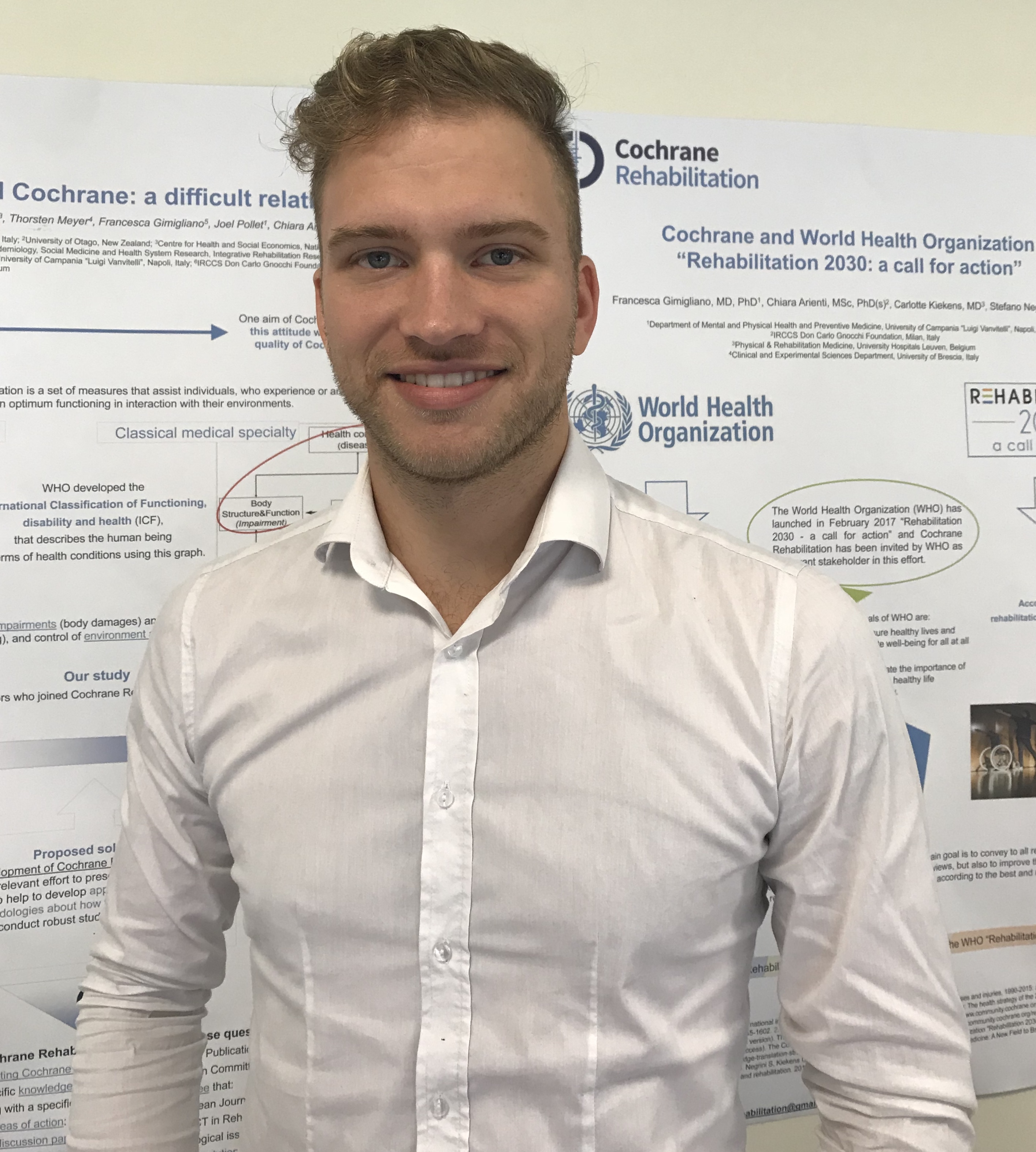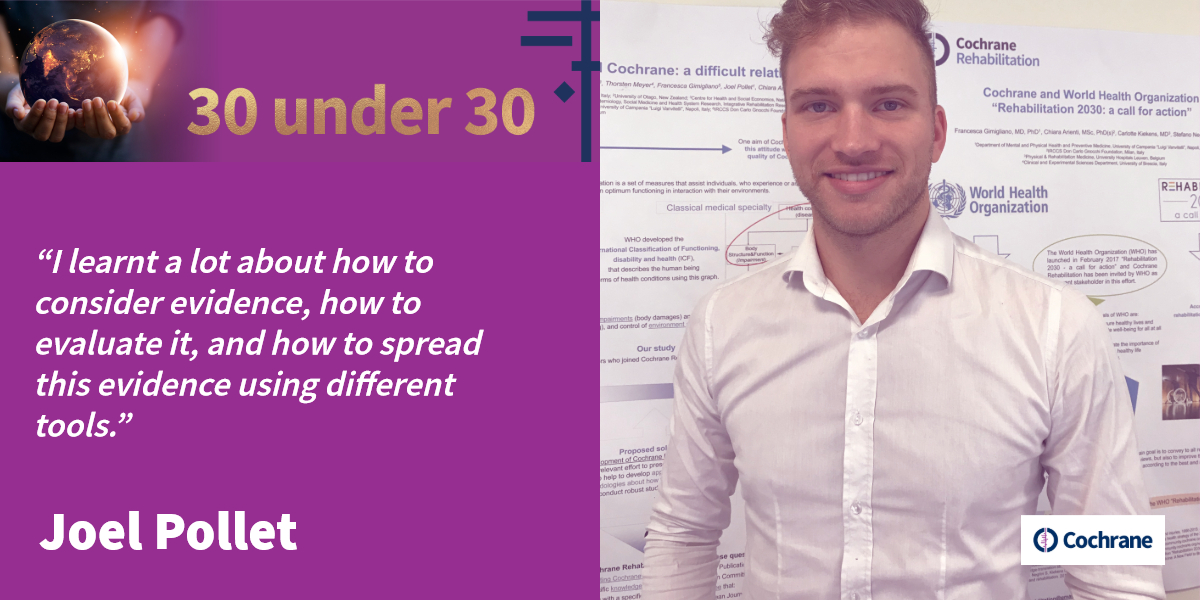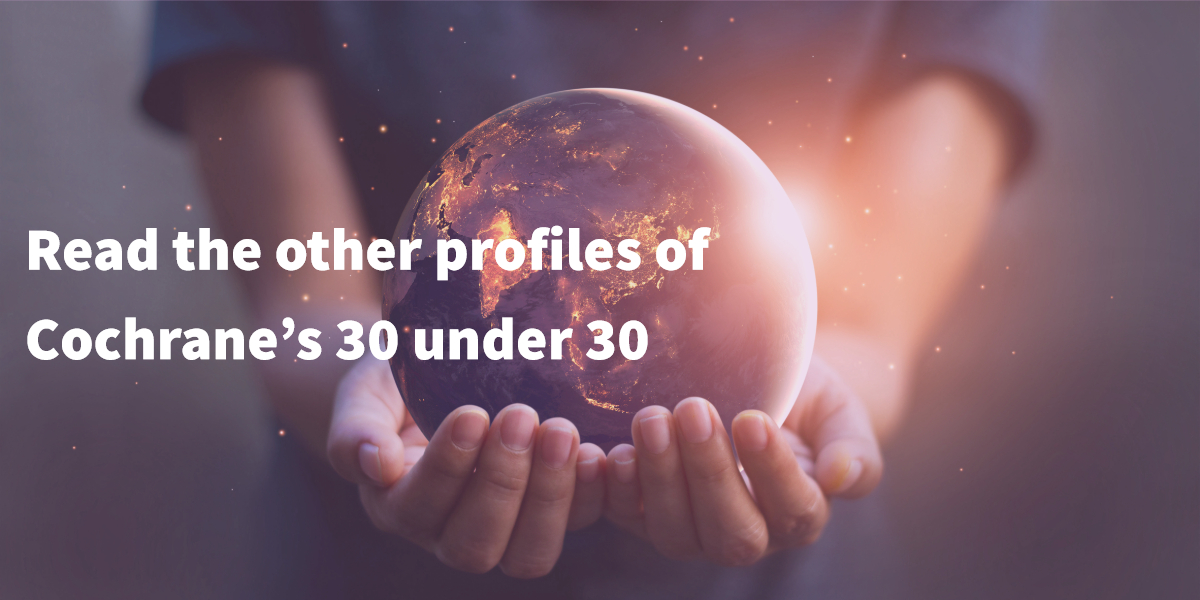
Cochrane is made up of 13,000 members and over 50,000 supporters who come from more than 130 countries, worldwide. Our volunteers and contributors are researchers, health professionals, patients, carers, people passionate about improving health outcomes for everyone, everywhere.
Cochrane is an incredible community of people who all play their part in improving health and healthcare globally. We believe that by putting trusted evidence at the heart of health decisions we can achieve a world of improved health for all.
Many of our contributors are young people working with Cochrane as researchers, citizen scientists, medical students, and volunteer language translators and we want to recognize the work of this generation of contributors as part of a new series called, Cochrane’s “30 under 30."
In this series, we will interview 30 young people, 30 years old or younger who are contributing to Cochrane activities in a range of ways, all promoting evidence-informed health decision making across the world.
We will be hearing from them in a series of interviewees published over the coming months.
We're keen to hear from you. Would you like to take part in this series? Do you know someone you'd like to see interviewed? Contact kabbotts@cochrane.org. Or if you want to know more about Cochrane’s work contact membership@cochrane.org where our community support team will be happy to answer your questions.

Age: 26
Occupation: Physiotherapist
Program: Cochrane Rehabilitation field
How did you first hear about Cochrane?
The first time I heard about Cochane was at University, while I was studying for my graduation thesis looking for the best evidences available on Stroke rehabilitation. In doing it I found and read my first Cochrane Systematic Review, which provided me a lot of information for my thesis project and also for my work after the studies.
How did you become involved with Cochrane? What is your background?
I graduated as Physiotherapist in 2016 at University of Brescia, Italy. I got more familiar with Cochrane’s world right after my graduation, as my thesis supervisor offered me the opportunity to work with him for Cochrane
What do you do in Cochrane?
I work in the headquarters of the Cochrane Rehabilitation field, where my colleagues and I manage and assist the work of the Director, Coordinator and committees of our field: Communication, Education, Publication, Methodology and Review Tagging. Our aim is to create and perform activities of knowledge translation for all the world of Rehabilitation. As part of my work I assist with some colleagues the creation of an ebook on Cochrane Systematic Reviews in the rehabilitation area, that are summarized for different audience.
What specifically do you enjoy about working for Cochrane and what have you learnt?
I particularly enjoy the possibility given to everyone to express their opinion and thoughts taking more into consideration the contents rather than their background or age. Since I’m in Cochrane I learnt a lot about how to consider evidence, how to evaluate it, and how to spread this evidence using different tools.
What are your future plans?
The chance I had two years ago of working within Cochrane Rehabilitation also changed my future plans. I had thought I would have worked as a physiotherapist, now I still know that I want to do it but with more consciousness of how to do it. But first I’d like to do a PhD in neurological rehabilitation as it is my favourite field of action; then I hope to have the opportunity author a Cochrane Systematic Review on this topic and last but not least keep on working for Cochrane Rehabilitation.

In your personal experience, what one thing could Cochrane do better to improve its global profile?
In my opinion Cochrane is doing a great job trying to improve its global profile, however I think it could strengthen it's relationship with clinicians, in particular attempt to develop as many knowledge translation tools as possible in order to make all the evidence produced as accessible and comprehensible as possible for those people.
What do you hope for Cochrane for the future?
The best I hope for Cochrane’s future is an improvement in the review production, especially with a more open sight to the clinical needs of High quality evidence, as we all know that Cochrane with its high quality reviews is able to do.
How important is it that young people get involved in Cochrane?
From my point of view, the presence of young people in Cochrane is fundamental, the training and experience made by young researchers in Cochrane is key to keep the activity and aims of Cochrane alive in the future.
A right generational exchange is the basis for every organisation that wants to pursuit its activities and mission over the years, and this can be done only involving and stimulate the young people to get involved in Cochrane, a community comprised of people from all over the world, with different backgrounds and different ages who can give as many diverse perspectives.
What would your message be to other young people who want to get involved with Cochrane’s work but not sure where to start….?
The collaboration with Cochrane showed me how Cochrane offers many different ways and tools to get involved in its activities, via Taskexchange for example, or with the activities of the different centres and fields. Starting from simple tasks like translating few pages or identifying RCTs, to authoring reviews or managing knowledge translation projects.


